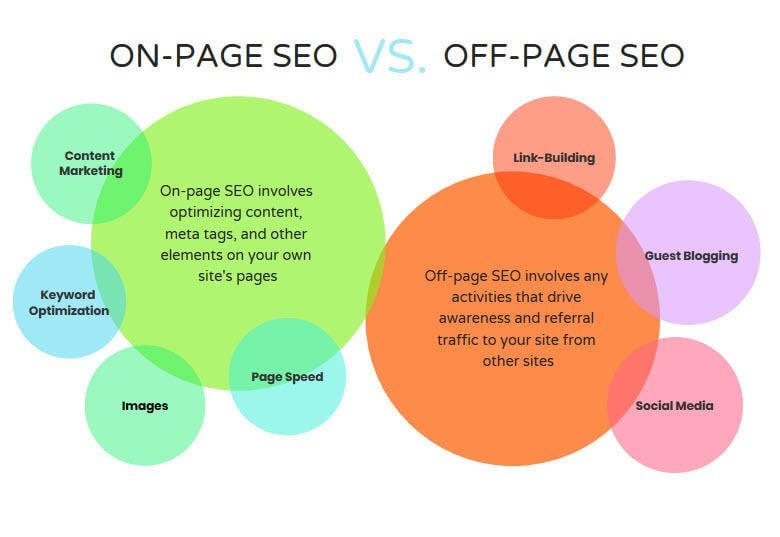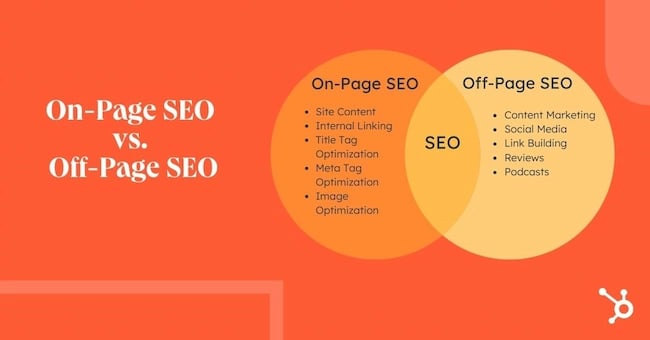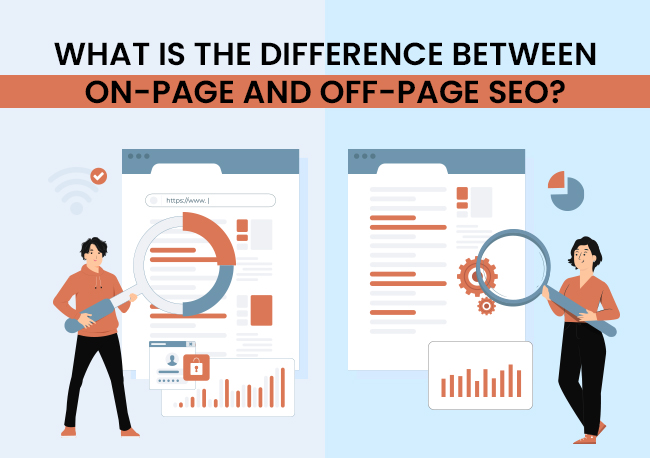Uncover the secrets of On-Page vs Off-Page SEO strategies and find out which approach will boost your website’s ranking!

Image courtesy of via DALL-E 3
Table of Contents
Welcome to the world of SEO! Have you ever wondered how websites appear at the top of search engine results? Well, that’s where SEO comes in. SEO, which stands for Search Engine Optimization, helps websites become more visible online. There are two main types of SEO: on-page SEO and off-page SEO. Let’s dive in and explore what they’re all about!
What is SEO?
SEO is like a secret code that websites use to communicate with search engines like Google. By using specific words and tricks, websites can climb higher in search results, making it easier for people to find them when they search for something online.
Why is SEO Important?
Imagine you have a fantastic lemonade stand, but it’s hidden in a maze where no one can find it. That’s where SEO comes in handy! It helps your website stand out in the crowded world of the internet, bringing more visitors to check out your lemonade.
Overview of On-Page and Off-Page SEO
Now, let’s talk about the two sides of the SEO coin: on-page and off-page SEO. On-page SEO focuses on what’s inside your website, like words, pictures, and hidden codes. Off-page SEO, on the other hand, looks at what others are saying about your website and how popular it is on the internet. Both work together to boost your website’s visibility online!
Understanding On-Page SEO
When it comes to optimizing your website for search engines like Google, on-page SEO plays a crucial role. But what exactly does on-page SEO involve? Let’s break it down into key components to help you understand how it works.
Using Keywords
Keywords are like the secret codes that tell search engines what your webpage is all about. By strategically placing relevant keywords in your content, titles, and meta descriptions, you can help search engines understand and rank your website better. It’s essential to use keywords naturally and not stuff them excessively, as this can lead to penalties from search engines.
Creating Quality Content
Content is king in the world of SEO. High-quality content that is informative, engaging, and valuable to your audience not only helps with your rankings but also keeps visitors on your site longer. Make sure your content is well-written, error-free, and offers something unique to stand out from the competition.
HTML Tags and Their Roles
HTML tags may sound technical, but they are simple elements that help search engines navigate and understand your website. Titles, meta descriptions, and headers are like signposts that guide search engines to the most important parts of your content. By using these tags correctly, you can improve your website’s visibility in search results.
Internal Links
Internal links are links that point to other pages within your website. These links help search engines discover new pages on your site, establish hierarchy, and improve user experience by guiding visitors to related content. By strategically placing internal links, you can boost the overall SEO of your website.
Exploring Off-Page SEO
When it comes to improving your website’s visibility on search engines, off-page SEO plays a crucial role. Unlike on-page SEO that focuses on optimizing elements within your website, off-page SEO involves activities that take place outside of your site to enhance its credibility and authority in the eyes of search engines.
Understanding Backlinks
One of the key components of off-page SEO is building backlinks. Backlinks are links from other websites that direct users to your site. Search engines view backlinks as a vote of confidence in your content, signaling that others find your website valuable and authoritative. The more high-quality backlinks you have, the more likely your site is to rank higher in search results.
Social Media Presence
Having a strong presence on social media platforms can also impact your site’s SEO. By sharing your content on social media and engaging with your audience, you can drive more traffic to your site and increase your online visibility. Search engines take into account social signals as a measure of your site’s relevance and credibility, so it’s essential to be active on social media.
Guest Blogging
Another effective off-page SEO strategy is guest blogging, where you write articles for other websites in your industry. By contributing valuable content to reputable sites, you can earn backlinks to your own site and establish yourself as an authority in your field. Guest blogging not only drives traffic to your site but also boosts your site’s SEO by improving its link profile.
Online Reviews and Reputation
Online reviews are another off-page factor that can influence your site’s SEO. Positive reviews not only build trust with potential customers but also signal to search engines that your business is legitimate and reliable. Encouraging satisfied customers to leave reviews and managing your online reputation can positively impact your site’s search engine rankings.
Comparing On-Page and Off-Page SEO
When it comes to boosting your website’s visibility on search engines, you’ll often hear about two main strategies: on-page SEO and off-page SEO. While both are crucial for improving your site’s rankings, they differ in their approaches and focus. Let’s dive into the key differences and similarities between these two SEO tactics.
Main Differences
On-page SEO revolves around optimizing elements within your website itself, such as using relevant keywords, creating quality content, and structuring HTML tags. It’s all about making your site user-friendly and search engine-friendly. On the other hand, off-page SEO deals with external factors like backlinks from reputable sites, social media presence, guest blogging, and online reviews. These external signals help search engines understand the credibility and authority of your website.
Key Similarities
While on-page and off-page SEO have distinct focuses, they share a common goal of improving your website’s visibility and ranking on search engine results pages. Both strategies aim to enhance your site’s reputation, relevance, and trustworthiness in the eyes of search engines. Additionally, they rely on utilizing high-quality content and strategic optimization techniques to attract organic traffic.
Choosing the Right Balance
For a well-rounded SEO strategy, it’s essential to strike a balance between on-page and off-page tactics. By optimizing your website’s internal elements with on-page SEO and building a strong external presence through off-page SEO, you can maximize your chances of ranking higher in search results. Neglecting either aspect can limit the effectiveness of your overall SEO efforts. Remember, a holistic approach to SEO is key to long-term success.
Practical Tips for On-Page SEO
Keywords are like puzzle pieces that tell search engines what your webpage is about. To find the right keywords, think about what words people would use to search for your content. Once you have your keywords, make sure to use them naturally in your content. Avoid stuffing too many keywords in one place, though, as search engines might see that as spammy.

Image courtesy of www.wordstream.com via Google Images
Improving Page Load Speed
Have you ever been on a website that takes forever to load? It’s frustrating, right? Visitors might leave if your page takes too long to load. To prevent this, optimize your images and use web-friendly formats like JPEG or PNG. Minimize the use of large files and enable browser caching to speed up load times.
Optimizing Images
Images can make your webpage more engaging, but they can also slow it down if not optimized. To improve your SEO, use descriptive file names and add alt text to describe the image. This helps search engines understand the content of your images, leading to better visibility in search results.
Practical Tips for Off-Page SEO
One essential strategy for enhancing your website’s SEO is to focus on building quality backlinks. Backlinks are links that lead from other websites back to yours, signaling to search engines that your site is reputable and authoritative. To earn good backlinks, consider reaching out to industry influencers or websites related to your niche and offer to contribute valuable content. You can also create shareable content that people naturally want to link to. Remember, quality is more important than quantity when it comes to backlinks.
Engaging with Social Media
Social media platforms can be powerful tools for boosting your off-page SEO. By actively engaging with your audience on platforms like Facebook, Twitter, Instagram, and LinkedIn, you can increase brand visibility and drive traffic back to your website. Share your content, interact with followers, and participate in relevant conversations to expand your reach and influence. Remember to use relevant keywords and hashtags to optimize your social media posts for search engines.
Participating in Online Communities
Another effective off-page SEO strategy is to participate in online communities such as forums, discussion groups, and Q&A sites. By contributing helpful and insightful answers to questions related to your niche, you can establish yourself as an authority in your field and drive traffic to your website through your profile or signature links. Be sure to follow community guidelines and avoid spammy or self-promotional behavior. Building relationships within these communities can also lead to natural backlink opportunities.
Common Mistakes to Avoid
One common mistake that people make in SEO is overusing keywords. While it’s important to include relevant keywords on your website, stuffing them unnaturally into your content can actually hurt your site’s ranking. Search engines penalize websites that engage in keyword stuffing, so it’s essential to use keywords in a natural and strategic way.

Image courtesy of blog.hubspot.com via Google Images
Ignoring Mobile Optimization
Another mistake to avoid is neglecting mobile optimization. With the increasing use of mobile devices to browse the internet, it’s crucial to ensure that your website is mobile-friendly. If your site is not optimized for mobile viewing, you could be missing out on a significant amount of traffic and potential customers. Make sure your website is responsive and provides a seamless user experience across all devices.
Buying Backlinks
Buying backlinks may seem like a quick way to improve your site’s SEO, but it can actually have detrimental effects. Search engines like Google can detect when backlinks are purchased rather than earned organically. This can lead to penalties that harm your website’s ranking and credibility. Focus on building quality backlinks through legitimate means rather than resorting to buying them.
Tools to Help with SEO
When it comes to improving your website’s search engine optimization (SEO), there are several tools available that can make the process easier and more effective. These tools are designed to help you optimize your on-page and off-page SEO strategies, ultimately boosting your website’s visibility and ranking on search engine results pages. Let’s take a look at some of the most useful tools for SEO:
Keyword Research Tools
One of the most important aspects of SEO is keyword research. By identifying the right keywords to target, you can attract more organic traffic to your website. Tools like Google Keyword Planner, SEMrush, and Ahrefs can help you find relevant keywords, analyze their search volume and competition, and track their performance over time. These tools provide valuable insights to guide your content creation and optimization efforts.
Content Optimization Tools
Creating high-quality content that is optimized for search engines is key to improving your on-page SEO. Tools like Yoast SEO and Moz Pro offer content optimization features that help you structure your content, add relevant keywords, and ensure proper formatting for better search engine visibility. These tools provide recommendations for improving your content to attract more organic traffic and engage your audience effectively.
Backlink Analysis Tools
Off-page SEO relies heavily on building quality backlinks from reputable websites. To monitor and manage your backlink profile, tools like Ahrefs, Moz Link Explorer, and SEMrush Backlink Analytics can provide valuable insights into your backlink profile, including the number of backlinks, their quality, and their impact on your website’s SEO performance. These tools help you identify opportunities for building new backlinks and address any issues that may be affecting your website’s ranking.
Summary
In this article, we covered the essential aspects of on-page and off-page SEO and how they contribute to optimizing a website for search engines. On-page SEO focuses on elements within your website, such as using relevant keywords, creating high-quality content, optimizing HTML tags, and incorporating internal links. Off-page SEO, on the other hand, deals with external factors like backlinks, social media presence, guest blogging, and online reviews.

Image courtesy of www.hostitsmart.com via Google Images
We discussed the differences between on-page and off-page SEO, emphasizing that while on-page SEO directly involves optimizing your website, off-page SEO involves building credibility and authority through external sources. However, both strategies are crucial for a well-rounded SEO approach, as they complement each other to enhance a website’s visibility and ranking on search engine results pages.
Additionally, we provided practical tips for improving on-page and off-page SEO, such as using keywords effectively, improving page load speed, optimizing images, building quality backlinks, engaging with social media, and participating in online communities. By following these strategies, website owners can strengthen their SEO efforts and attract more organic traffic.
We also highlighted common mistakes to avoid in SEO, such as overusing keywords, ignoring mobile optimization, and buying backlinks. These pitfalls can negatively impact a website’s performance and should be avoided to maintain a healthy SEO strategy.
Lastly, we introduced various tools that can assist with SEO, including keyword research tools, content optimization tools, and backlink analysis tools. These tools can streamline the SEO process and provide valuable insights to help website owners make informed decisions to improve their online presence.
Frequently Asked Questions (FAQs)
What is the difference between on-page and off-page SEO?
On-page SEO involves optimizing elements on your website like content, HTML tags, and internal links to improve your search engine rankings. Off-page SEO, on the other hand, focuses on factors external to your site, such as backlinks, social media presence, guest blogging, and online reviews, to boost your site’s authority and credibility in the eyes of search engines.
Can I focus on one type of SEO?
While it’s possible to prioritize either on-page or off-page SEO, a balanced approach that incorporates both strategies is highly recommended for optimal results. By combining efforts in both areas, you can improve your site’s visibility, authority, and overall performance in search engine rankings.
How long does it take to see results?
The timeline for seeing results from your SEO efforts can vary depending on various factors such as the competitiveness of your industry, the quality of your content, and the effectiveness of your optimization strategies. Generally, it may take several weeks to several months before you start noticing significant improvements in your search rankings. It’s essential to be patient and consistent with your SEO practices to achieve long-term success.







